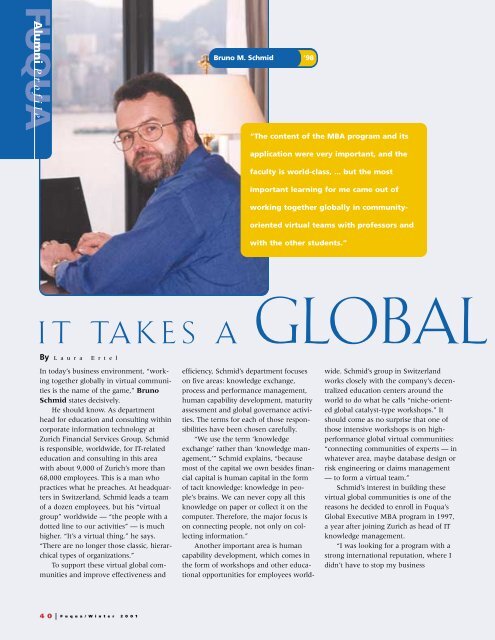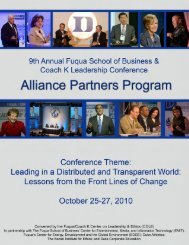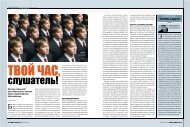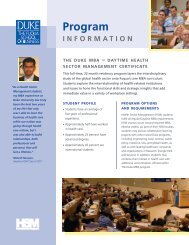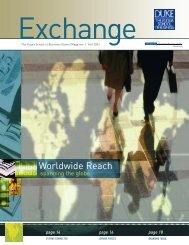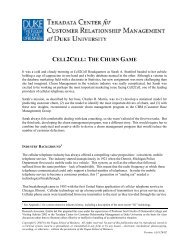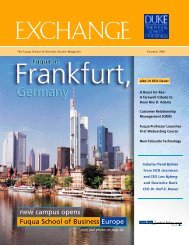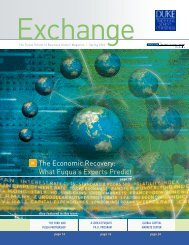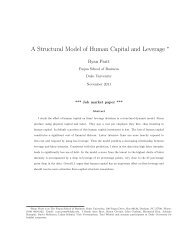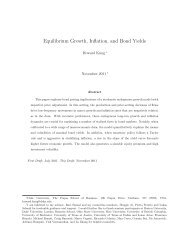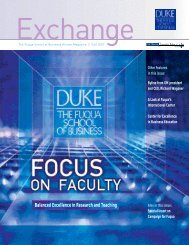A l u m n i M a g a z i n e - Duke University's Fuqua School of Business
A l u m n i M a g a z i n e - Duke University's Fuqua School of Business
A l u m n i M a g a z i n e - Duke University's Fuqua School of Business
Create successful ePaper yourself
Turn your PDF publications into a flip-book with our unique Google optimized e-Paper software.
FUQUA<br />
Alumni Pr<strong>of</strong>ile In today’s business environment, “working<br />
together globally in virtual communities<br />
is the name <strong>of</strong> the game,” Bruno<br />
Schmid states decisively.<br />
He should know. As department<br />
head for education and consulting within<br />
corporate information technology at<br />
Zurich Financial Services Group, Schmid<br />
is responsible, worldwide, for IT-related<br />
education and consulting in this area<br />
with about 9,000 <strong>of</strong> Zurich’s more than<br />
68,000 employees. This is a man who<br />
practices what he preaches. At headquarters<br />
in Switzerland, Schmid leads a team<br />
<strong>of</strong> a dozen employees, but his “virtual<br />
group” worldwide — “the people with a<br />
dotted line to our activities” — is much<br />
higher. “It’s a virtual thing,” he says.<br />
“There are no longer those classic, hierarchical<br />
types <strong>of</strong> organizations.”<br />
To support these virtual global communities<br />
and improve effectiveness and<br />
40I<br />
F u q u a / W i n t e r 2 0 0 1<br />
Bruno M. Schmid ’98<br />
“The content <strong>of</strong> the MBA program and its<br />
application were very important, and the<br />
faculty is world-class, ... but the most<br />
important learning for me came out <strong>of</strong><br />
working together globally in community-<br />
oriented virtual teams with pr<strong>of</strong>essors and<br />
with the other students.”<br />
IT TAKES A GLOBAL<br />
By L a u r a E r t e l<br />
efficiency, Schmid’s department focuses<br />
on five areas: knowledge exchange,<br />
process and performance management,<br />
human capability development, maturity<br />
assessment and global governance activities.<br />
The terms for each <strong>of</strong> those responsibilities<br />
have been chosen carefully.<br />
“We use the term ‘knowledge<br />
exchange’ rather than ‘knowledge management,’”<br />
Schmid explains, “because<br />
most <strong>of</strong> the capital we own besides financial<br />
capital is human capital in the form<br />
<strong>of</strong> tacit knowledge: knowledge in people’s<br />
brains. We can never copy all this<br />
knowledge on paper or collect it on the<br />
computer. Therefore, the major focus is<br />
on connecting people, not only on collecting<br />
information.”<br />
Another important area is human<br />
capability development, which comes in<br />
the form <strong>of</strong> workshops and other educational<br />
opportunities for employees world-<br />
wide. Schmid’s group in Switzerland<br />
works closely with the company’s decentralized<br />
education centers around the<br />
world to do what he calls “niche-oriented<br />
global catalyst-type workshops.” It<br />
should come as no surprise that one <strong>of</strong><br />
those intensive workshops is on highperformance<br />
global virtual communities:<br />
“connecting communities <strong>of</strong> experts — in<br />
whatever area, maybe database design or<br />
risk engineering or claims management<br />
— to form a virtual team.”<br />
Schmid’s interest in building these<br />
virtual global communities is one <strong>of</strong> the<br />
reasons he decided to enroll in <strong>Fuqua</strong>’s<br />
Global Executive MBA program in 1997,<br />
a year after joining Zurich as head <strong>of</strong> IT<br />
knowledge management.<br />
“I was looking for a program with a<br />
strong international reputation, where I<br />
didn’t have to stop my business


